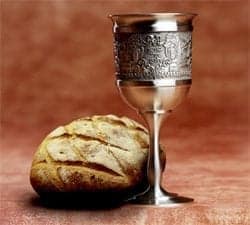We are instructed in Scripture to examine ourselves as we come to this Table. But because we are instructed to do so, we must also follow instructions in the way we do so.
“Wherefore whosoever shall eat this bread, and drink this cup of the Lord, unworthily, shall be guilty of the body and blood of the Lord. But let a man examine himself, and so let him eat of that bread, and drink of that cup. For he that eateth and drinketh unworthily, eateth and drinketh damnation to himself, not discerning the Lord’s body” (1 Cor. 11:27–29).
Over the years, many saints have stumbled over that word unworthily. They shrink back from the Supper, saying that they know themselves to be utterly unworthy. They know what their life was like before their conversion, and since their conversion there have been numerous unworthy moments as well. If I really examine myself, they think, how could I possibly come?
But before you examine your heart, take care to examine the text. As Spurgeon pointed out many years ago, the world unworthily is an adverb, not an adjective. It is not describing a man who has behaved in unworthy ways in time past. It is describing a man who, in his manner of coming right this minute, is doing so flippantly, or contemptuously, or with complacency. It is an adverb that describes the coming, not an adjective describing a sinner who needs to come.
So the emptier you feel, the greater the need to come. There is fullness here, fullness for your emptiness. So the weight of your sin bears you down, but there is one here who will lift all of your burdens and will bear them away. So you feel sometimes as though your heart is black as hell, but here is edible light.
Humble yourself, and do not fear that adverb. Come.
So come, and welcome, to Jesus Christ.


“So the emptier you feel, the greater the need to come. There is fullness here, fullness for your emptiness.”
Oh, I love that. That’s quite beautiful. You’ve captured the idea perfectly.
the world unworthily is an adverb, not an adjective.
Should be?
the word “unworthily” is an adverb, not an adjective.
What say, Valerie Kyriosity MEE*?
*Most Excellent Editrix
I think B is just pointing out the world/word typo, not questioning the adverb/adjective distinction.
Let me be the referee (as a Bostonian Jesuit bred Iraqi student):
an adverb is a figure of speech modifying a verb as to how, when,etc………………..
Worthily is an adverb…………………class dismissed
An adverb can also modify an adjective, as in “gloriously happy,” in which gloriously is an adverb.
As a Catholic I’ve always wondered how this verse could make sense to a Protestant. If communion is just a piece of bread and is only a symbol of Christ’s body and blood, how could someone be guilty of the actual body and blood of Christ? How could there be discernment of the Lord’s body when it’s not actually the Lord’s body? But from a Catholic perspective it makes perfect sense. Our communion, the Eucharist, is the *actual* body and blood of Christ (body, blood, soul, and divinity), so it’s necessary that we discern what we are receiving and that… Read more »
Reformed sacramentology views elements as more than “only a symbol.” It is the Lord’s Body in a real spiritual sense, albeit not corporeally. Not all Protestants are the same.
Thanks for the response, that makes a little more sense. So how does the bread go from being just a piece of bread to becoming the Lord’s Body in a real spiritual sense? Also, what happens to any leftover elements that don’t get consumed?
God has promised His special presence when it is taken. Nothing “happens” to the bread itself, it is a thing that God is doing through the sacrament. Calvin described it as Christ present through the power of the Holy Spirit. Similarly, we don’t believe that water “does” anything in baptism, but God is doing something using that means.
So the leftover elements are still just leftover bread and wine. Nothing in the elements changes, it’s just that God chooses to act through them.
Some Lutherans also believe in the Real Presence. The explanation is a bit different though. So do some Anglicans.
BTW, your question is a good one for Protestants who believe that the Lord’s Supper is a mere symbol or memorial. It is because of concerns like this (among other things) that Reformed theologians find that view lacking.
Please check the grammar of the previous verses (23-26), it’s clear they are a parenthesis about how the Lord instituted the Supper. You have to read before that parenthesis to see what was Paul talking about: verses 17 to 22 show the Corinthians despising each other, there were divisions among them, some even were even getting drunk. While indeed we reformed believe in a special presence of the Lord in the supper, there is no transubstantiation here, as it wasn’t the purpose of this passage.